

Natural Treatments and Help w/ Tics, Tourettes, PANDAS.
Gifted. Using Technology to Reach Unreachable Students. The iPad made a transformation in John's learning demeanor.
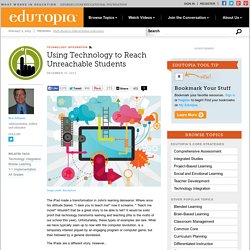
Where once his attitude blared, "I dare you to teach me! " now it screams, " Teach me more! " Wouldn't that be a great story to be able to tell? It would be solid proof that technology transforms learning and teaching (this is the motto of our school this year). Unfortunately, these types of examples are rare. The iPads are a different story, however... One ninth grade teacher at Southside High School mentioned that she noticed that students that normally do not participate in class discussions are being very active in electronic discussions. With iPad in hand, I have witnessed a student who normally has minimal attention span, carefully construct his dream mansion, brick-by-brick.
I asked two of my tenth grade students, "Do you feel smarter now that you have an iPad to use? " In general, however, students are using the iPads the right way, on the right things because the teachers have given them a reason to use them. Reference.
NES Think-Tac-Toes and Cubing Activities. RubiStar Home. New Page 1. Howard Gardner claims that all human beings have multiple intelligences.
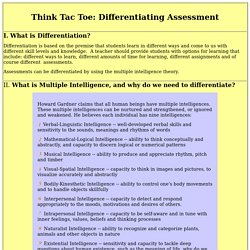
These multiple intelligences can be nurtured and strengthened, or ignored and weakened. He believes each individual has nine intelligences: Verbal-Linguistic Intelligence -- well-developed verbal skills and sensitivity to the sounds, meanings and rhythms of words Mathematical-Logical Intelligence -- ability to think conceptually and abstractly, and capacity to discern logical or numerical patterns. Differentiated Instructional Strategies - Differentiated Strategies for Assessment. Whyville By Cathleen Galas and Jen Sun June 2007 What is Whyville? Whyville.net is an inquiry based, learner-centered, online sc.
6 Tools to Determine Your Kids' Learning Styles. I homeschool for many reasons, not the least of which is that I can do a better job with my two kids than a classroom teacher can with 25 to 30 (or more!).
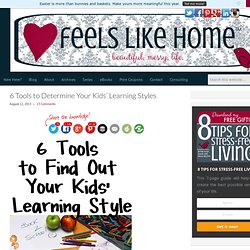
There is no room for debate on this issue. Educational experts have called for decades for smaller class sizes, but as budgets get tighter, class sizes get bigger. There’s no doubt that a personalized education far exceeds a factory model. Except. What if I’m treating my homeschooled kids as if they were seats in an assembly-line classroom? When Grace showed signs of reading readiness, I purchased Handwriting Without Tears and Hooked on Phonics, and I printed hundreds of pages’ worth of sight words and Montessori materials from my favorite early childhood websites.
No kidding. She hated Hooked on Phonics. My daughter was ready – and eager – to learn to read, but she didn’t fit the approach I tried to force her into. I should have known better. , our school time became dramatically easier. Anyway. The image above comes from link #3. Public (Domain) Library: Free Downloadable Audiobooks Online.
I'd like to share a Web site called LibriVox, which provides free, downloadable audiobooks from the public domain: Users download the audiobooks in MP3 format and listen to them on their computer or copy them onto an MP3 player.
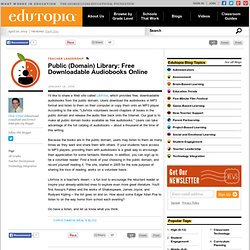
According to the site, "LibriVox volunteers record chapters of books in the public domain and release the audio files back onto the Internet. Our goal is to make all public domain books available as free audiobooks. " Young Child Learning Style Assessment. A learning style is the way that a person approaches learning.
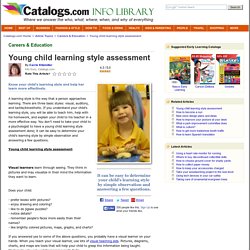
There are three basic styles: visual, auditory, and tactile/kinesthetic. If you understand your child's learning style, you will be able to teach him, help with his homework, and explain your child to his teacher in a more effective way. You don't need to take your child to a psychologist to have a young child learning style assessment done; it can be easy to determine your child's learning style by simple observation and answering a few questions. Young child learning style assessment Visual learners learn through seeing. Does your child: - prefer books with pictures? If you answered yes to some of the above questions, you probably have a visual learner on your hands. Visual learners may have difficulty paying attention when you are reading aloud a book that has no pictures. Next we have the auditory learners, who learn through listening and hearing information. Does your child: The third learning style is tactile/kinesthetic.